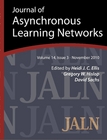Promoting Hybrid Learning through an Open Source EBook Approach
DOI:
https://doi.org/10.24059/olj.v14i3.139Keywords:
Elearning, Open source learning content, Hybrid learning, Mobile learning, Ubiquitous learning, Web 2.0, social networkingAbstract
Educational technology is developing rapidly, making education more accessible, affordable, adaptable, and equitable. Students now have the option to choose a campus that can provide excellent blended learning curriculum with minimal geographical restraints. We proactively explore ways to maximize the power of educational technologies to increase enrollment, reduce failure rates, improve teaching efficiency, and cut costs without sacrificing high quality or placing extra burden on faculty. This mission is accomplished through open source learning content design and development. We developed scalable, shareable, and sustainable e-learning modules as book chapters that can be distributed through both computers and mobile devices. The resulting e-learning building blocks can automate the assessment processes, provide just-in-time feedback, and adjust the teaching material dynamically based upon each student’s strengths and weaknesses. Once built, these self-contained learning modules can be easily maintained, shared, and re-purposed, thus cutting costs in the long run. This will encourage faculty from different disciplines to share their best teaching practices online. The end result of the project is a sustainable knowledge base that can grow over time, benefit all the discipline, and promote learning.Published
2010-11-20
Issue
Section
Open Educational Resources
License
As a condition of publication, the author agrees to apply the Creative Commons – Attribution International 4.0 (CC-BY) License to OLJ articles. See: https://creativecommons.org/licenses/by/4.0/.
This licence allows anyone to reproduce OLJ articles at no cost and without further permission as long as they attribute the author and the journal. This permission includes printing, sharing and other forms of distribution.
Author(s) hold copyright in their work, and retain publishing rights without restrictions






